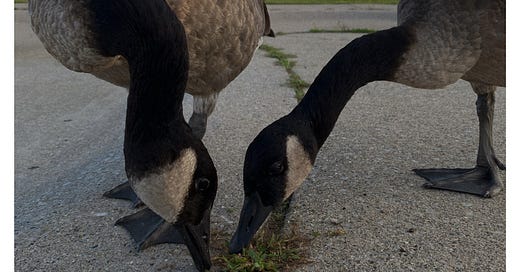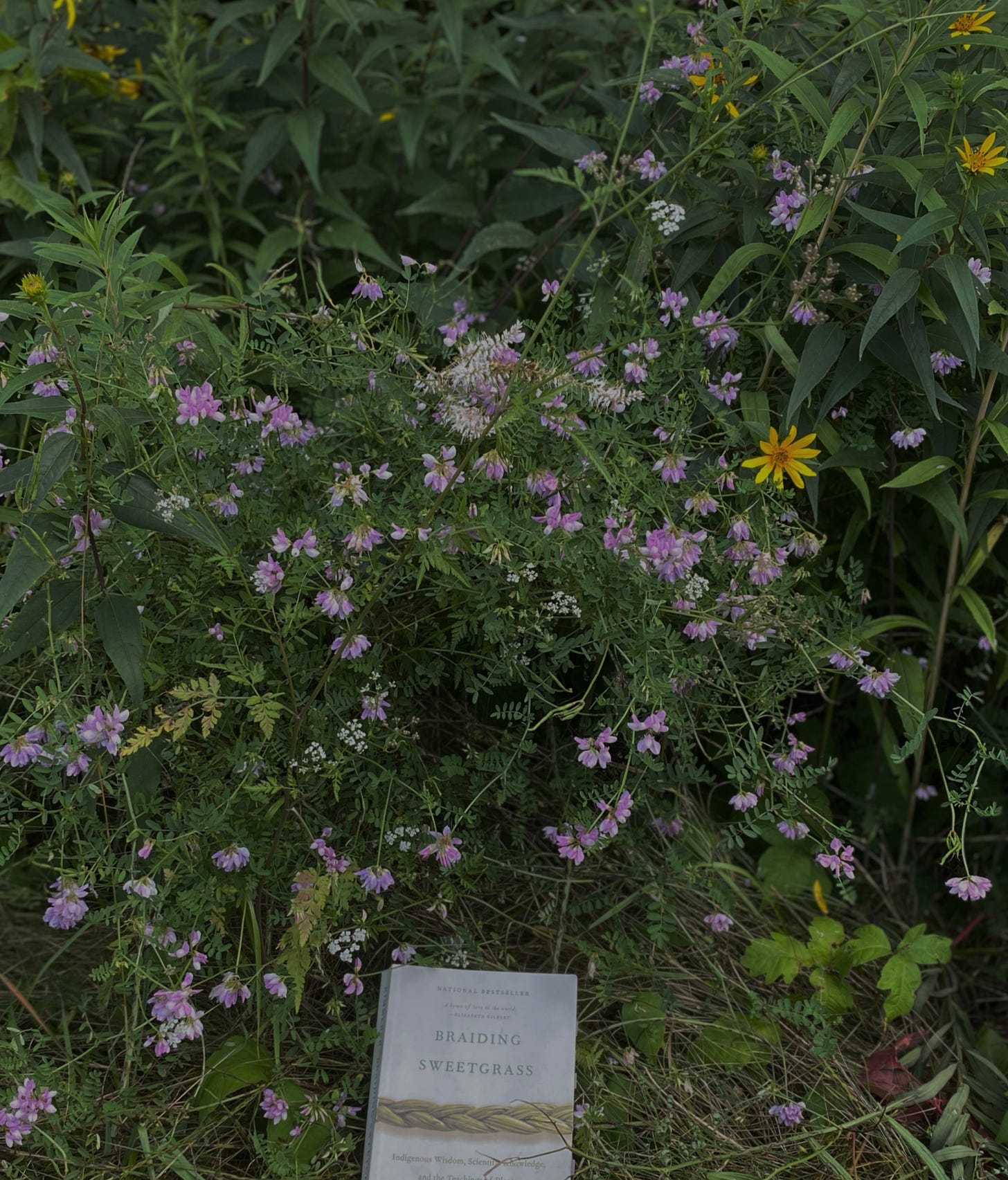The Book Changing Me
A review or loving rant for the non-fiction book Braiding Sweetgrass by Robin Wall Kimmerer.
An ode to the wonderful Robin Wall Kimmerer. I often do not read books that haunt me, but when I do they tend to be non-fiction. Real life terrifies, absolutely.
The time spent between the covers of Braiding Sweetgrass was tortuous. I cannot explain this in any other way. Typically, I can read through a book until my eyes are tired, but this book has exhausted my mind, and my beliefs, and most importantly shifted my gratitude.
This book haunted me the moment I brought it home. I would pass my shelf fingering the pages and stopping on one-off sentences that struck me down with no meaning. The insides were one thing, but the physical copy of this book was also very intentional.
I own the Milkweed paperback edition, and I can feel the thought placed into production. Braiding Sweetgrass is printed on post-consumer-waste paper and is so soft to the touch, that I cannot help but be amazed.
Species Loneliness - a deep, unnamed sadness stemming from estrangement from the rest of Creation, from the loss of relationship. [pages 208 & 209].
This definition provided by Philosophers really made me think. I had to dig deep into myself and where I lie. I do not know the names of trees or plant species though I admire their beauty frequently. And because of this, I now change my mission to get to know them, find out their names, and understand the things I admire. My end goal is to fall in love and build a relationship with my surroundings. I need to understand why holding reused paper felt like hope.
I need to understand why holding reused paper felt like hope.
Stepping out of the book a little bit, I cannot help but think I sound like a raging hippie. Falling in love with plants? Trees? I am yet to hug a tree, but the urge is there. How do I fit into the world Robin Kimmerer explores? I am nothing but questions and willing to work for the answers.
In an interview and book signing with the author, an audience member asked her a question along the lines of, ‘Hey I am a normal-ish person, what the fuck am I supposed to be doing?’ and the answer was much simpler than I had expected. “Raise a garden, raise good children, and raise a ruckus.” Well, there it is. A simple formula [‘children’ can be replaced with many other things synonymous with your life of course] to which action can be done.
“Raise a garden, raise good children, and raise a ruckus.”
Personally, I started composting. I realize it's too late for a garden but preparing soil can be done anytime. I hope to share this journey with my son and teach him as I am also learning. I feel the pressure of this as I teach him about bees, and that they are not bad, but so very necessary for pollination. I tell him about spiders, and how they are helpful in catching the annoying flies and gnats. I have an obligation to teach him, and this book instilled this idea in me.
I understand I am awful for a synopsis, for the summary of books. If you want to know about a book you should read it, this especially goes for this one. You could read a Wikipedia page, watch interviews, or talk about this with someone who reads it, but you will not understand until you consume it. The motherhood, language, and love and knowledge for Creation expressed by Kimmerer is simply not a form for summary, which is why I do not intend to attempt this.
Goldenrod and Asters
It is not a secret that I love bees, the fuzzy pollen-covered cuties with wings. As beautiful as they are, they have such important jobs. I know this, you know this. But what I did not know is how the plants also know this. The phenomenon of yellow and purple flowers growing together is by no means a mistake, nor just a pretty roadside view.
The combination of yellow and purple specifically attracts bees for pollination. Botanists have no other answer as to why goldenrods and asters grow side by side. They do it for the bees.
In Michigan, instead of asters, we have goats rue, a purple flower or weed and they grow roadside. Anywhere the goats rue is, the yellow wildflowers [that I am not sure the name of, but I will learn] are also close by. I know they are found roadside because that is where I took this picture.
As I was crouched down with my book on the side of a busy backroad, the first thing I noticed was the busy sound of bees. Though to my back were miles of pavement, I felt for a moment I was in a never-ending field of flowers and honeybees. My instant thought was to grab the blanket from my car and lay with the flowers, but to avoid the cops being called on me for suspicious roadside behavior, I took the photo and moved along. The sounds of those bees still sing in my ears and give me such joy, a discovery of what is real, and sometimes the real thing is the poem with no words.
This beauty did not only affect me, but this beauty of asters and goldenrods was the reason for Robin Wall Kimmerer to become a Botanist. In her freshmen interview, she expressed her love for this phenomenon and the beauty of nature, but her professor advised her that if she wanted to study beauty, she would be better off in art school.
“Everything I was bringing with me was not science.” Youtube Interview
This situation was such an epiphany for the author, as she sat in the interview room, she could not help but remember the stories of her grandfather and ancestors who were brought to American Indian boarding schools in order to decimate their language, culture, and so much more. At this moment, the professor provided an option; we will give you the knowledge of nature but leave yours at the door. The world is fortunate enough to know, Robin brought the information with her and presented it so beautifully.
Sources







Your admiration for plants and trees and the desire to get to know them, I can so relate! Those lines made me think of Annie Dillard when she said, "I would like to know grasses and sedges—and care." This is so beautiful! I am guilty of getting panicky when there's a bee in sight, a fear that was somehow instilled in me as a child, but now I'm inspired to counter that fear. 🤍